- Joined
- Jul 23, 2012
- Messages
- 2,781
- Reaction score
- 2,489
Depression.
Anxiety.
Mental illness.
Suicide.
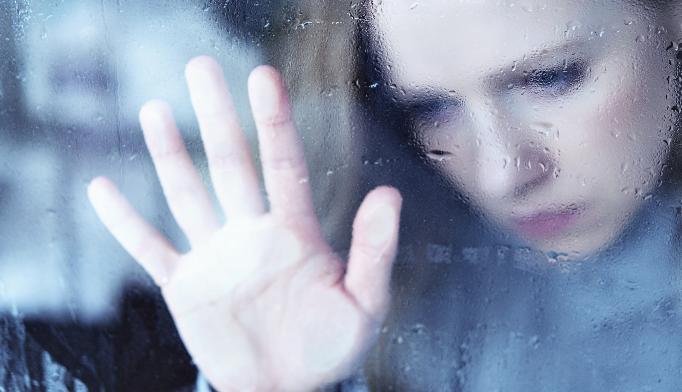
Healthcare is a field where we work to help treat patients and make them better. But for healthcare workers, and those aspiring to become healthcare workers, there can be a paradoxical effect. Instead of feeling better, they feel worse. Here and there we hear a little bit about mental illness and suicide among medical students, residents, and physicians. The stories are heart-wrenching. A lot of times, friends and loved ones will be blind-sided and not realize that anything was wrong in the first place. In many cases, people don't quite understand what it really means. I think that it is a very important topic that often gets glossed over with many misconceptions. I would like to try my best and hit on many of these points, as I feel passionately about this topic.
Also, contrary to my previous threads, this has nothing to do with medical school admissions or extra-curriculars. I was originally going to post this in the "Medical Student" forum, but opted not to because there is far more traffic in the pre-med section, and it would be good to know some of these things before going to medical school. Even if you end up not going to medical school, it is good to know about mental illness and not fall victim to the stigmas surrounding it.
THOUGHT #1: Planes2Doc, we all know that you are a very nice, smart, and ridiculously handsome PGY-1 internal medicine resident that would make an amazing intensivist, but you're not a psychiatrist. So why should be we listen to what you have to say?
Aww, thanks! You're making me blush. But I feel that this is precisely what provides me the good opportunity to talk about this. I once had a pre-med on this forum call me out in a recent thread saying that I was speaking from a pretty high soap box due to my relative inexperience. Yeah, so I'm not an attending physician know-it-all that is ready to retire (though I'd look pretty good for my age if I was), but I still have plenty of life experiences including one unique thing that provides me with a different perspective on the topic. So here's a little bit about me:
But I feel that this is precisely what provides me the good opportunity to talk about this. I once had a pre-med on this forum call me out in a recent thread saying that I was speaking from a pretty high soap box due to my relative inexperience. Yeah, so I'm not an attending physician know-it-all that is ready to retire (though I'd look pretty good for my age if I was), but I still have plenty of life experiences including one unique thing that provides me with a different perspective on the topic. So here's a little bit about me:
I'm a Jewish first-generation American whose family immigrated from the former Soviet Union that grew up spending a lot of time with my grandparents, using the CTA Red Line at an early age. I worked for two airlines in revenue management before pursuing a post-bacc. When I started medical school, I thought I wanted to be a psychiatrist. I have always been a shoulder to lean on for friends. I spent a month in an inpatient psychiatric unit on the north side of Chicago, where I saw many of the patients that you would likely encounter on the CTA Red Line. It was emotionally the most draining experience of medical school, and decided that perhaps psychiatry was not for me. I ended up matching into Internal Medicine.
So let's dissect some of these experiences and how they pertain to mental illness and perception.
"I'm a Jewish first-generation American whose family immigrated from the former Soviet Union"
Most of my friends were either born here or came from the former Soviet Union as well. A lot of the cultural aspects from "home" still resonate today. For instance, one of my best friends does not believe that depression or mental illness exist. If someone is depressed he says, "it's all in your head! Just be happy and get over it." These words may sound familiar. I am sure you may have heard these words many times from family, friends, or other people around you. I just noticed that in some cultures it is more prevalent. I have a Russian Jewish friend that struggled for months with severe depressive symptoms (she fit SIG E CAPS criteria) for the sake of NOT taking an anti-depressant. I had a fellow classmate in medical school who was from Asia, and seemed burned out and depressed. He was unwilling to go to a psychiatrist since he said there were cultural ramifications for doing so. I'm not going to pretend to be an expert on how well or not cultures perceive and respond to mental illness. But all I know is that some of you will have less access to help depending on your family and those around you. Not everyone is going to be open and accepting of it, and this will most definitely prove to be a challenge. It kills me when I see people suffer for the sake of not acknowledging depression or not taking medications. Why do people have to suffer (both literal and rhetorical)?
"that grew up spending a lot of time with my grandparents, using the CTA Red Line at an early age."
I'm a train enthusiast and have a pretty sweet train set that I'll put back together once I move to a permanent location. This was in part thanks to my grandpa, who used to take me all over Chicago, where we rode buses and trains all the time. I really enjoyed it, and saw both the good and then the... Umm... Not so good.
The CTA Red Line is a north-south line that spans from the edges of the city. Up north you have more affluent individuals, but south of downtown, it's a bit on the rougher side. It is sometimes referred to as the "Rolling Theater." Over the years, I have seen just about everything. I have seen people do the following: Smoking pot, smoking crack, urinating on the seats/floor, defecating on the seats/floor, masturbating in clear view of passengers, loudly talking to themselves, talking loudly about random things to other people, randomly coming up to other passengers and yelling profanities at them, and countless of other things that are still somewhere in my memory. People I know would refer to them as the "crazies." For a while, I would encounter the same people over and over again. I remember this one buff looking guy that would take the train from Evanston, and would constantly shout profanities randomly. One time I saw him at the local health club, and he was literally going from treadmill to treadmill and screaming profanities at the top of his lungs to the people on them. They all ignored him. I think that he has Tourette's, but will never be sure.
Then there was this one post, that was on Facebook of a woman talking to herself on the train. The original Facebook post has more comments. The top comment on Facebook said the following: "I find it disturbing that Chicago has no programs for people in this condition. They shouldn't be on the street they are a danger to themselves and others." A level-headed response further down the thread was: "Exactly. There should be some kind of help for them. This is mental illness--not just someone being weird." Nevertheless, people often laugh at these people and shun them. This is the kind of mental illness that is visible. It's so impossible to miss, because people all have their own stories of the people they encountered on the Red Line and in many other situations. This is not something you would likely see in medical students, if at all.

"When I started medical school, I thought I wanted to be a psychiatrist. I have always been a shoulder to lean on for friends. I spent a month in an inpatient psychiatric unit on the north side of Chicago, where I saw many of the patients that you would likely encounter on the CTA Red Line. It was emotionally the most draining experience of medical school, and decided that perhaps psychiatry was not for me."
It was one thing to be a shoulder to lean on for friends and dealing with high-functioning (otherwise "invisible" mental illness) individuals versus being in an inpatient unit with many of those similar patients as mentioned above. It was very emotionally difficult to see people that were unable to function well even while on medication. At that point I decided it wasn't for me, and I have great respect for the psychiatrists that need to deal with this day in and day out.
THOUGHT #2: Thanks for your life story Planes2Doc! But what does this have to do with mental illness in medical school?
I was pointing out a couple of important points. First, that medical illness can either be invisible or be so obvious that it becomes memorable. I also wanted to point out the difference between someone who doesn't believe it exists or shuns it versus a psychiatrist. Not everyone you encounter will be a psychiatrist or psychologist, who will be open-minded about your feelings and everything you tell them. At the same time, not every single person you will encounter will say that you're just imagining all of these things, and that it's "just in your head." Most people will be somewhere on the spectrum between two of these extremes.
So where does this put me? I realize that mental illness is an "invisible disease," and that it's not something that someone randomly pulled out of their ass. But at the same time, I am not nearly as open-minded as a psychiatrist, and never will be. It takes a special kind of person to hear certain things from patients. This puts me in a position where I'm more of a spectator with some life experience, and will hopefully provide a different perspective and insight into this often taboo subject that people are afraid to talk about. I am not a psychiatrist, and I am not a doubter of mental illness.
THOUGHT #3: What is depression?
"The symptoms of depression — technically referred to as major depressive disorder — are characterized by an overwhelming feeling of sadness, isolation, and despair that lasts two weeks or longer at a time. Depression isn’t just an occasional feeling of being sad or lonely, like most people experience from time to time. Instead, a person feels like they’ve sunk into a deep, dark hole with no way out — and no hope for things ever changing." (Source)
Here is SIG E CAPS, which is the criteria used to help diagnose it:

You need to see a board certified health care professional in order to be diagnosed. Do not try self-diagnosing or self-medicating! But do make sure to seek professional help.
THOUGHT #4: Who can get depression?
Anyone! It doesn't discriminate. It doesn't matter who you are, where you're from, how much money you have, how old you are, or any other factor. It can happen to anyone!
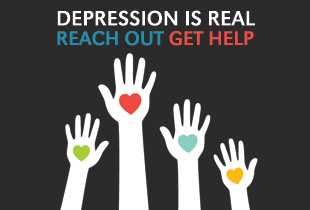
Do not let anyone tell you that it's "all in your head" or that you're a failure because of cultural norms. You should professional seek help to treat this, and not have to suffer for arbitrary or ridiculous reasons.
THOUGHT #5: If I have depression, can I still be a doctor?
Unfortunately, there are some people that are very misguided with their thinking of psychiatric conditions. Just because someone may have depression or anxiety does not mean that they should be banished to the depths of society and never do anything worthwhile. Think of mental illness like an organic illness. If someone has hypertension, they take anti-hypertensive medications, and are perfectly capable of living their lives to the fullest. It is the same for mental illness. People that have depression and anxiety under control live perfectly normal productive lives. Do not let anything hold you back. If you feel depressed or anxious, do not let it make the decisions for you! If you decide not to be a doctor, then it will be your own decision. Don't let your mental illness make the decision for you! If you feel like you're not making your own decisions because of mental illness, then I suggest you see a healthcare professional as soon as possible to get this treated. Don't let anyone tell you that you are not worthy or incapable of becoming a doctor, especially those that believe mental illness is bullsh1t. They aren't the ones that are going to live your life, you will. So do everything you can to get yourself healthy so you can accomplish all of your dreams.
There are highly toxic memes that float around by people that do not understand mental illness. They are ridiculous, and make me angry when I see them. Do not pay attention to them. The people that spread these are so very misinformed.
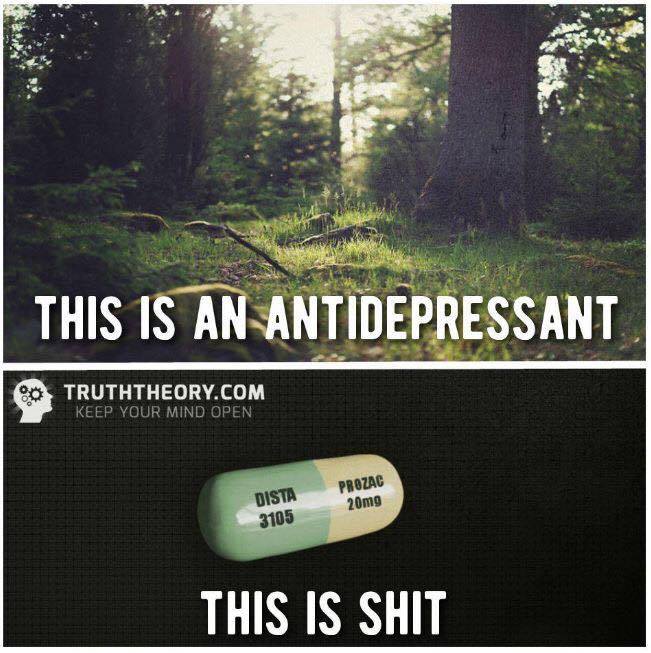
Awful, awful, awful. This is like saying your chemotherapy drug for your cancer is $h1t (oh wait, there are people that keep posting the Big Pharma Conspiracy crap all over the place). I could not think of any worse thing to say to someone that suffers from psychiatric illness that can be effectively managed with medications.
THOUGHT #6: What are the ramifications of having a psychiatric diagnosis? What if someone finds out I have depression, anxiety, ADHD, etc?
For the majority of people (see below), there is this thing called HIPAA. Whatever you discuss with a healthcare provider is strictly confidential with the exception that you plan to harm either yourself or others. Therefore, plenty of people will see a psychiatrist (or even their primary care physician), get prescribed an anti-depressant, and go about their daily lives. Far fewer people will require inpatient psychiatric hospitalization. The forms I have filled out before (for licensing as well as purchasing fire arms) asked specifically about involuntary or inpatient psychiatric hospitalizations. No where does anyone ask if you are on an anti-depressant, anti-anxiety, anti-psychotic, or ADHD medication. Therefore, if you have a well-controlled psychiatric condition that has never required inpatient psychiatric hospitalization or being held against your will, then you will never have to disclose anything from your personal medical history. The medical licensing boards ask if you have any conditions that would prevent you from performing your duties, and as long as your conditions are under control, then you would say "no." This is just like any other physician that might be on medications for hypertension, hypothyroidism, or many other common issues that you see.
THOUGHT #7: Why are people in healthcare susceptible?
Ah, that paradox! It all starts as a pre-med. At least with the methods proposed here on SDN, it is incredibly stressful process. Pre-meds typically place all of their eggs in one basket in their convoluted journey to get a medical school acceptance. But that's a whole other discussion for another day. Anyway, college can be pretty stressful overall, and if someone did well in high school and didn't show signs of existing mental illness, they might start to show it in college. But as we all know, people going to medical school only make up a small portion of college students. There are plenty of people doing other things, and anyone would be susceptible to the stressors encountered in college. Whether it be being away from home and living independently, coursework, friends, significant others, or any other issues.
Let's instead dive deeper into healthcare professionals. We are in the business of helping to heal others. But during this process, we either forget to think about keeping ourselves healthy, or we meet incredibly malicious people. It's kind of ironic that some of the nastiest personalities I have ever had the displeasure of meeting are physicians. Let's fast-forward just for a second to something that would occur as a medical student or in residency, just to give you an example.
Constructive criticism versus malice:
This is medical education, therefore we are constantly learning. Our mentors can have a wide array of personalities and approaches to... education. Let's pretend you're a medical student or resident, and you are seeing a patient that is experiencing a hypertensive crisis in the emergency department. You do your history and physical, but do not do a thorough eye exam checking for papilledema or do a neuro exam beyond grossly observing cranial nerves II through XII. Let's see what constructive criticism would be like in this situation:
You: I just finished seeing Mr. Smith in room 12. [INSERT PRESENTATION HERE]
Preceptor: Did you do an eye exam to check for papilledema?
You: Sorry, I forgot.
Preceptor: Okay. Please make sure that you will remember to do it next time, because it's important to make sure the patient isn't suffering from increased intracranial pressure. What were the patient's reflexes like?
You: Oh sorry, I didn't do anything beyond observing cranial nerves II-XII.
Preceptor: Okay. Make sure to do a thorough neuro exam next time. Make sure you test the cranial nerves individually, and check the patient's motor strength, sensation, and reflexes as well.
You: Thank you, I will be sure to do that next time.
Preceptor: I'm glad. There's a reason why I am an attending physician and you are a medical student, you're here to learn.
Now let's imagine the same situation with a malicious preceptor:
You: I just finished seeing Mr. Smith in room 12. [INSERT PRESENTATION HERE]
Preceptor: Did you do an eye exam to check for papilledema?
You: Sorry, I forgot.
Preceptor: Are you f**king kidding me?! How the f**k would you forget to do something like that?!
You: Umm...
Preceptor: You are a f**cking idiot! What would happen if the patient had increased intracranial pressure? He would die because you're so stupid.
You: I'm sorry, I didn't know.
Preceptor: Shut up. I can't deal with your attitude. I have no idea how we will continue working together, let alone you even becoming a doctor.
You: Okay...
Preceptor: What about the neuro exam?
...
And you can only imagine how this becomes a vicious cycle, with the preceptor asking for things the student or resident does not have, and each time giving more and more verbal abuse. I have been lucky enough to have only experienced this once as a medical student, but know that this is common place. I also made this up from my imagination, but can only imagine how horrible things can get, and are probably far worse than this. Verbal and emotional abuse is rampant, and this only serves to either worsen existing mental illness, or cause new ones. I can't believe that this is coming from people that are supposed to help others. Last time I checked, torture isn't an effective teaching method.

THOUGHT #8: So what can YOU do if you have experienced these situations?
I'm honestly not too sure how to handle every case, as it will be different for many people. A lot of people just take the abuse and don't say anything. The most important thing you can remember is: DO NOT TAKE IT PERSONALLY! If someone is very nasty, they are likely nasty to everyone and not only you. I know it's easier said than done, but don't let them get under your skin. Now, if you do suffer from depression or anxiety, then it makes the situation harder. At this point, I would recommend seeing a counselor at your program. These are provided free of cost and are completely confidential (of course assuming you are not threatening to harm yourself or others). This can be an absolute godsend for those who need it. They are there for a reason, and are there to help you. So please, please, please take advantage of these resources!
Here's another thing to do that will make you feel better, and it's best said with a quote:
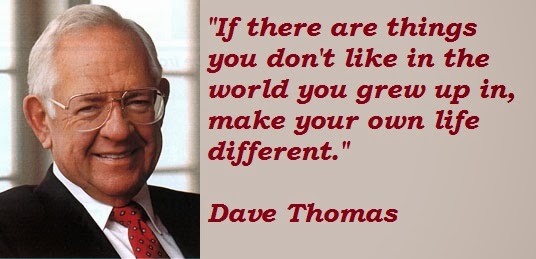
When you're a resident or in a position where you are overseeing others, don't be that same nasty malicious person that made your life horrible. Be the complete opposite, so you can make other peoples' lives better! I mean, that's why you're here right, to help others? While pre-meds are busy trying to do a bunch of random entry-level clinical jobs and learn a bunch of random skills that may or may not help them in the future, they often lose sight of the one important thing. BEING HUMAN. You can learn all the skills you need in medical school and beyond, but no one can teach you to be a better human being. That's something you need to learn yourself. At my former employer, Southwest Airlines, they prided themselves on following the Golden Rule for treatment of both employees and customers. I have never seen so many happy people. It really made things run better from all perspectives, and made working there great. The Golden Rule is incredibly simple as well, treat others the way you want to be treated! Be kind and empathetic to others, and you will not only be a better physician, but will also be happier and feel better about yourself. There is absolutely no reason to continue an endless cycle of abuse simply because those above you went through it.
THOUGHT #9: The validation process, medical school, and SDN make for an interesting combination.
I have many friends in different fields. I have quite a few friends that are teachers and nurses. I have noticed a recurring trend on Facebook with their posts. I typically see teacher and nursing school memes all the time about how hard things are:
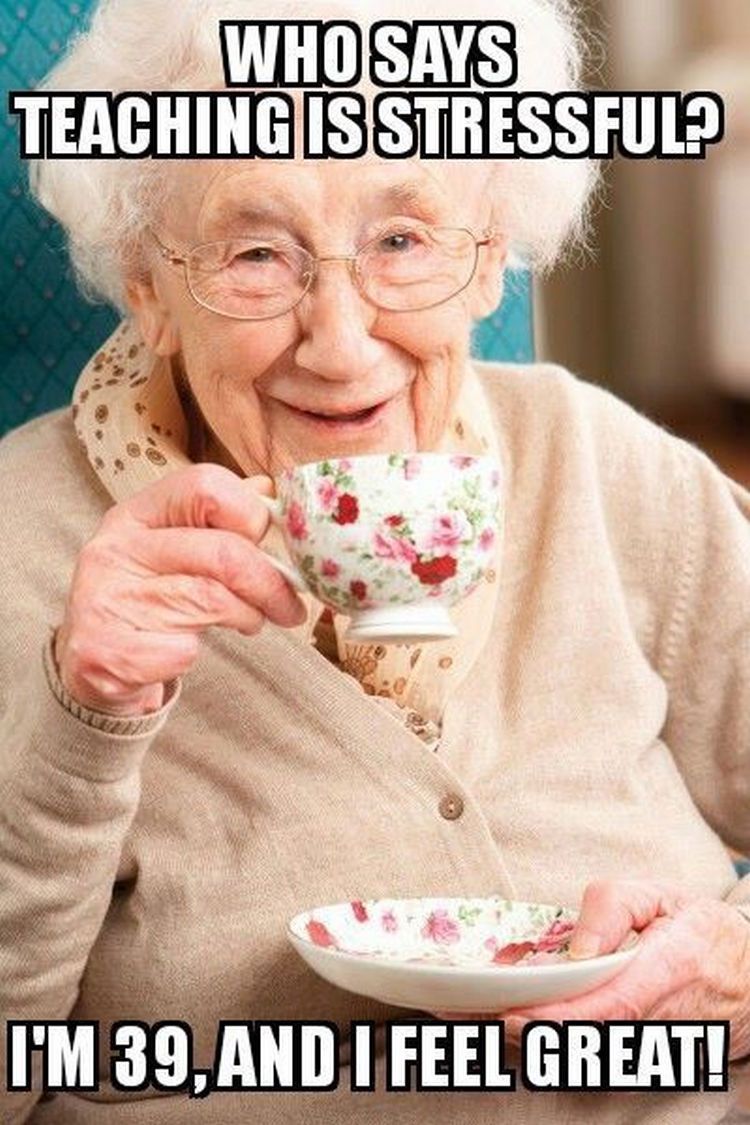
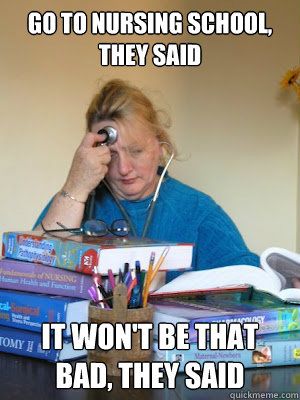
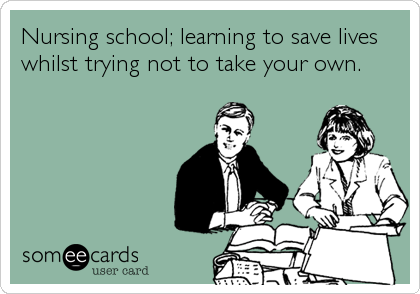
I'm not trying to downplay anyone's experiences, I'm just pointing out that I see these all the time. I have the utmost respect for teachers (my wife is a teacher) and nurses, and am pointing out that these memes and posts are quite common. I guess it's validation of difficult experiences. It's like the time you take a very difficult exam, and ask other people how it went. When others tell you how bad it was, you feel better about yourself because you have validated the fact that it was difficult. As for people in medical school, I didn't see too many Facebook posts about their coursework too often (though I saw quite a bit of memes and gifs on the private class Facebook page). I figured that a lot of people were busy busting their asses and hating their lives. People that didn't previously have mental illness started to develop them. Medical students that never took anti-depressants or benzos were suddenly starting to take them on a regular basis. The smallest things can make a medical student snap. So imagine what happens when you're working way past your limit and you're doing some light reading on SDN. You see medical students posting how much they love medical school, how easy it is, and that they are having way more fun and free time than they did in college. Then when you decide to answer how bad things are, you get told that you're doing it all wrong. Now imagine how that would make someone with depression or anxiety, let alone just about anyone feel! Not well. It's not a good feeling when someone is downplaying and invalidating your experiences. In fact, if you are already so depressed and starting to have suicidal thoughts, the last thing you want is for someone to boast about how awesome they are doing and how everything you're doing is all wrong.
I remember one time I was incredibly stressed, and told a guy I used to be friends with that I wanted a new camera lens (happy stuff during medical school) but couldn't afford it. He asked me why I didn't have a part-time job on top of medical school. I told him because no one is expected to do it because of the difficulty. He told me I was doing it wrong then. Said the guy who failed out of community college. That was the straw that broke the camel's back that day, and I was pretty upset.
So what can you do? Do not downplay peoples' experiences! There is no need to boast how amazing things are for you (when in reality, they probably aren't and you're just busting your ass anyhow) and how someone else is doing things wrong. There are medical students that are literally killing themselves! So why would anyone want to make things even worse by trying to invalidate and downplay their experiences? Having this happen to you makes you feel far worse than $h1t. Therefore, if you're scoring 260 on your USMLE Step 1, made AOA at your school with minimal effort, and are going to match into radiation oncology, then good for you. We are proud of you. But there's no need to boast about it and make others feel worse, and don't even try humble bragging about your experiences.
Anxiety.
Mental illness.
Suicide.

Healthcare is a field where we work to help treat patients and make them better. But for healthcare workers, and those aspiring to become healthcare workers, there can be a paradoxical effect. Instead of feeling better, they feel worse. Here and there we hear a little bit about mental illness and suicide among medical students, residents, and physicians. The stories are heart-wrenching. A lot of times, friends and loved ones will be blind-sided and not realize that anything was wrong in the first place. In many cases, people don't quite understand what it really means. I think that it is a very important topic that often gets glossed over with many misconceptions. I would like to try my best and hit on many of these points, as I feel passionately about this topic.
Also, contrary to my previous threads, this has nothing to do with medical school admissions or extra-curriculars. I was originally going to post this in the "Medical Student" forum, but opted not to because there is far more traffic in the pre-med section, and it would be good to know some of these things before going to medical school. Even if you end up not going to medical school, it is good to know about mental illness and not fall victim to the stigmas surrounding it.
THOUGHT #1: Planes2Doc, we all know that you are a very nice, smart, and ridiculously handsome PGY-1 internal medicine resident that would make an amazing intensivist, but you're not a psychiatrist. So why should be we listen to what you have to say?
Aww, thanks! You're making me blush.
I'm a Jewish first-generation American whose family immigrated from the former Soviet Union that grew up spending a lot of time with my grandparents, using the CTA Red Line at an early age. I worked for two airlines in revenue management before pursuing a post-bacc. When I started medical school, I thought I wanted to be a psychiatrist. I have always been a shoulder to lean on for friends. I spent a month in an inpatient psychiatric unit on the north side of Chicago, where I saw many of the patients that you would likely encounter on the CTA Red Line. It was emotionally the most draining experience of medical school, and decided that perhaps psychiatry was not for me. I ended up matching into Internal Medicine.
So let's dissect some of these experiences and how they pertain to mental illness and perception.
"I'm a Jewish first-generation American whose family immigrated from the former Soviet Union"
Most of my friends were either born here or came from the former Soviet Union as well. A lot of the cultural aspects from "home" still resonate today. For instance, one of my best friends does not believe that depression or mental illness exist. If someone is depressed he says, "it's all in your head! Just be happy and get over it." These words may sound familiar. I am sure you may have heard these words many times from family, friends, or other people around you. I just noticed that in some cultures it is more prevalent. I have a Russian Jewish friend that struggled for months with severe depressive symptoms (she fit SIG E CAPS criteria) for the sake of NOT taking an anti-depressant. I had a fellow classmate in medical school who was from Asia, and seemed burned out and depressed. He was unwilling to go to a psychiatrist since he said there were cultural ramifications for doing so. I'm not going to pretend to be an expert on how well or not cultures perceive and respond to mental illness. But all I know is that some of you will have less access to help depending on your family and those around you. Not everyone is going to be open and accepting of it, and this will most definitely prove to be a challenge. It kills me when I see people suffer for the sake of not acknowledging depression or not taking medications. Why do people have to suffer (both literal and rhetorical)?
"that grew up spending a lot of time with my grandparents, using the CTA Red Line at an early age."
I'm a train enthusiast and have a pretty sweet train set that I'll put back together once I move to a permanent location. This was in part thanks to my grandpa, who used to take me all over Chicago, where we rode buses and trains all the time. I really enjoyed it, and saw both the good and then the... Umm... Not so good.
The CTA Red Line is a north-south line that spans from the edges of the city. Up north you have more affluent individuals, but south of downtown, it's a bit on the rougher side. It is sometimes referred to as the "Rolling Theater." Over the years, I have seen just about everything. I have seen people do the following: Smoking pot, smoking crack, urinating on the seats/floor, defecating on the seats/floor, masturbating in clear view of passengers, loudly talking to themselves, talking loudly about random things to other people, randomly coming up to other passengers and yelling profanities at them, and countless of other things that are still somewhere in my memory. People I know would refer to them as the "crazies." For a while, I would encounter the same people over and over again. I remember this one buff looking guy that would take the train from Evanston, and would constantly shout profanities randomly. One time I saw him at the local health club, and he was literally going from treadmill to treadmill and screaming profanities at the top of his lungs to the people on them. They all ignored him. I think that he has Tourette's, but will never be sure.
Then there was this one post, that was on Facebook of a woman talking to herself on the train. The original Facebook post has more comments. The top comment on Facebook said the following: "I find it disturbing that Chicago has no programs for people in this condition. They shouldn't be on the street they are a danger to themselves and others." A level-headed response further down the thread was: "Exactly. There should be some kind of help for them. This is mental illness--not just someone being weird." Nevertheless, people often laugh at these people and shun them. This is the kind of mental illness that is visible. It's so impossible to miss, because people all have their own stories of the people they encountered on the Red Line and in many other situations. This is not something you would likely see in medical students, if at all.

"When I started medical school, I thought I wanted to be a psychiatrist. I have always been a shoulder to lean on for friends. I spent a month in an inpatient psychiatric unit on the north side of Chicago, where I saw many of the patients that you would likely encounter on the CTA Red Line. It was emotionally the most draining experience of medical school, and decided that perhaps psychiatry was not for me."
It was one thing to be a shoulder to lean on for friends and dealing with high-functioning (otherwise "invisible" mental illness) individuals versus being in an inpatient unit with many of those similar patients as mentioned above. It was very emotionally difficult to see people that were unable to function well even while on medication. At that point I decided it wasn't for me, and I have great respect for the psychiatrists that need to deal with this day in and day out.
THOUGHT #2: Thanks for your life story Planes2Doc! But what does this have to do with mental illness in medical school?
I was pointing out a couple of important points. First, that medical illness can either be invisible or be so obvious that it becomes memorable. I also wanted to point out the difference between someone who doesn't believe it exists or shuns it versus a psychiatrist. Not everyone you encounter will be a psychiatrist or psychologist, who will be open-minded about your feelings and everything you tell them. At the same time, not every single person you will encounter will say that you're just imagining all of these things, and that it's "just in your head." Most people will be somewhere on the spectrum between two of these extremes.
So where does this put me? I realize that mental illness is an "invisible disease," and that it's not something that someone randomly pulled out of their ass. But at the same time, I am not nearly as open-minded as a psychiatrist, and never will be. It takes a special kind of person to hear certain things from patients. This puts me in a position where I'm more of a spectator with some life experience, and will hopefully provide a different perspective and insight into this often taboo subject that people are afraid to talk about. I am not a psychiatrist, and I am not a doubter of mental illness.
THOUGHT #3: What is depression?
"The symptoms of depression — technically referred to as major depressive disorder — are characterized by an overwhelming feeling of sadness, isolation, and despair that lasts two weeks or longer at a time. Depression isn’t just an occasional feeling of being sad or lonely, like most people experience from time to time. Instead, a person feels like they’ve sunk into a deep, dark hole with no way out — and no hope for things ever changing." (Source)
Here is SIG E CAPS, which is the criteria used to help diagnose it:

You need to see a board certified health care professional in order to be diagnosed. Do not try self-diagnosing or self-medicating! But do make sure to seek professional help.
THOUGHT #4: Who can get depression?
Anyone! It doesn't discriminate. It doesn't matter who you are, where you're from, how much money you have, how old you are, or any other factor. It can happen to anyone!

Do not let anyone tell you that it's "all in your head" or that you're a failure because of cultural norms. You should professional seek help to treat this, and not have to suffer for arbitrary or ridiculous reasons.
THOUGHT #5: If I have depression, can I still be a doctor?
Unfortunately, there are some people that are very misguided with their thinking of psychiatric conditions. Just because someone may have depression or anxiety does not mean that they should be banished to the depths of society and never do anything worthwhile. Think of mental illness like an organic illness. If someone has hypertension, they take anti-hypertensive medications, and are perfectly capable of living their lives to the fullest. It is the same for mental illness. People that have depression and anxiety under control live perfectly normal productive lives. Do not let anything hold you back. If you feel depressed or anxious, do not let it make the decisions for you! If you decide not to be a doctor, then it will be your own decision. Don't let your mental illness make the decision for you! If you feel like you're not making your own decisions because of mental illness, then I suggest you see a healthcare professional as soon as possible to get this treated. Don't let anyone tell you that you are not worthy or incapable of becoming a doctor, especially those that believe mental illness is bullsh1t. They aren't the ones that are going to live your life, you will. So do everything you can to get yourself healthy so you can accomplish all of your dreams.
There are highly toxic memes that float around by people that do not understand mental illness. They are ridiculous, and make me angry when I see them. Do not pay attention to them. The people that spread these are so very misinformed.

Awful, awful, awful. This is like saying your chemotherapy drug for your cancer is $h1t (oh wait, there are people that keep posting the Big Pharma Conspiracy crap all over the place). I could not think of any worse thing to say to someone that suffers from psychiatric illness that can be effectively managed with medications.
THOUGHT #6: What are the ramifications of having a psychiatric diagnosis? What if someone finds out I have depression, anxiety, ADHD, etc?
For the majority of people (see below), there is this thing called HIPAA. Whatever you discuss with a healthcare provider is strictly confidential with the exception that you plan to harm either yourself or others. Therefore, plenty of people will see a psychiatrist (or even their primary care physician), get prescribed an anti-depressant, and go about their daily lives. Far fewer people will require inpatient psychiatric hospitalization. The forms I have filled out before (for licensing as well as purchasing fire arms) asked specifically about involuntary or inpatient psychiatric hospitalizations. No where does anyone ask if you are on an anti-depressant, anti-anxiety, anti-psychotic, or ADHD medication. Therefore, if you have a well-controlled psychiatric condition that has never required inpatient psychiatric hospitalization or being held against your will, then you will never have to disclose anything from your personal medical history. The medical licensing boards ask if you have any conditions that would prevent you from performing your duties, and as long as your conditions are under control, then you would say "no." This is just like any other physician that might be on medications for hypertension, hypothyroidism, or many other common issues that you see.
THOUGHT #7: Why are people in healthcare susceptible?
Ah, that paradox! It all starts as a pre-med. At least with the methods proposed here on SDN, it is incredibly stressful process. Pre-meds typically place all of their eggs in one basket in their convoluted journey to get a medical school acceptance. But that's a whole other discussion for another day. Anyway, college can be pretty stressful overall, and if someone did well in high school and didn't show signs of existing mental illness, they might start to show it in college. But as we all know, people going to medical school only make up a small portion of college students. There are plenty of people doing other things, and anyone would be susceptible to the stressors encountered in college. Whether it be being away from home and living independently, coursework, friends, significant others, or any other issues.
Let's instead dive deeper into healthcare professionals. We are in the business of helping to heal others. But during this process, we either forget to think about keeping ourselves healthy, or we meet incredibly malicious people. It's kind of ironic that some of the nastiest personalities I have ever had the displeasure of meeting are physicians. Let's fast-forward just for a second to something that would occur as a medical student or in residency, just to give you an example.
Constructive criticism versus malice:
This is medical education, therefore we are constantly learning. Our mentors can have a wide array of personalities and approaches to... education. Let's pretend you're a medical student or resident, and you are seeing a patient that is experiencing a hypertensive crisis in the emergency department. You do your history and physical, but do not do a thorough eye exam checking for papilledema or do a neuro exam beyond grossly observing cranial nerves II through XII. Let's see what constructive criticism would be like in this situation:
You: I just finished seeing Mr. Smith in room 12. [INSERT PRESENTATION HERE]
Preceptor: Did you do an eye exam to check for papilledema?
You: Sorry, I forgot.
Preceptor: Okay. Please make sure that you will remember to do it next time, because it's important to make sure the patient isn't suffering from increased intracranial pressure. What were the patient's reflexes like?
You: Oh sorry, I didn't do anything beyond observing cranial nerves II-XII.
Preceptor: Okay. Make sure to do a thorough neuro exam next time. Make sure you test the cranial nerves individually, and check the patient's motor strength, sensation, and reflexes as well.
You: Thank you, I will be sure to do that next time.
Preceptor: I'm glad. There's a reason why I am an attending physician and you are a medical student, you're here to learn.
Now let's imagine the same situation with a malicious preceptor:
You: I just finished seeing Mr. Smith in room 12. [INSERT PRESENTATION HERE]
Preceptor: Did you do an eye exam to check for papilledema?
You: Sorry, I forgot.
Preceptor: Are you f**king kidding me?! How the f**k would you forget to do something like that?!
You: Umm...
Preceptor: You are a f**cking idiot! What would happen if the patient had increased intracranial pressure? He would die because you're so stupid.
You: I'm sorry, I didn't know.
Preceptor: Shut up. I can't deal with your attitude. I have no idea how we will continue working together, let alone you even becoming a doctor.
You: Okay...
Preceptor: What about the neuro exam?
...
And you can only imagine how this becomes a vicious cycle, with the preceptor asking for things the student or resident does not have, and each time giving more and more verbal abuse. I have been lucky enough to have only experienced this once as a medical student, but know that this is common place. I also made this up from my imagination, but can only imagine how horrible things can get, and are probably far worse than this. Verbal and emotional abuse is rampant, and this only serves to either worsen existing mental illness, or cause new ones. I can't believe that this is coming from people that are supposed to help others. Last time I checked, torture isn't an effective teaching method.

THOUGHT #8: So what can YOU do if you have experienced these situations?
I'm honestly not too sure how to handle every case, as it will be different for many people. A lot of people just take the abuse and don't say anything. The most important thing you can remember is: DO NOT TAKE IT PERSONALLY! If someone is very nasty, they are likely nasty to everyone and not only you. I know it's easier said than done, but don't let them get under your skin. Now, if you do suffer from depression or anxiety, then it makes the situation harder. At this point, I would recommend seeing a counselor at your program. These are provided free of cost and are completely confidential (of course assuming you are not threatening to harm yourself or others). This can be an absolute godsend for those who need it. They are there for a reason, and are there to help you. So please, please, please take advantage of these resources!
Here's another thing to do that will make you feel better, and it's best said with a quote:

When you're a resident or in a position where you are overseeing others, don't be that same nasty malicious person that made your life horrible. Be the complete opposite, so you can make other peoples' lives better! I mean, that's why you're here right, to help others? While pre-meds are busy trying to do a bunch of random entry-level clinical jobs and learn a bunch of random skills that may or may not help them in the future, they often lose sight of the one important thing. BEING HUMAN. You can learn all the skills you need in medical school and beyond, but no one can teach you to be a better human being. That's something you need to learn yourself. At my former employer, Southwest Airlines, they prided themselves on following the Golden Rule for treatment of both employees and customers. I have never seen so many happy people. It really made things run better from all perspectives, and made working there great. The Golden Rule is incredibly simple as well, treat others the way you want to be treated! Be kind and empathetic to others, and you will not only be a better physician, but will also be happier and feel better about yourself. There is absolutely no reason to continue an endless cycle of abuse simply because those above you went through it.
THOUGHT #9: The validation process, medical school, and SDN make for an interesting combination.
I have many friends in different fields. I have quite a few friends that are teachers and nurses. I have noticed a recurring trend on Facebook with their posts. I typically see teacher and nursing school memes all the time about how hard things are:


I'm not trying to downplay anyone's experiences, I'm just pointing out that I see these all the time. I have the utmost respect for teachers (my wife is a teacher) and nurses, and am pointing out that these memes and posts are quite common. I guess it's validation of difficult experiences. It's like the time you take a very difficult exam, and ask other people how it went. When others tell you how bad it was, you feel better about yourself because you have validated the fact that it was difficult. As for people in medical school, I didn't see too many Facebook posts about their coursework too often (though I saw quite a bit of memes and gifs on the private class Facebook page). I figured that a lot of people were busy busting their asses and hating their lives. People that didn't previously have mental illness started to develop them. Medical students that never took anti-depressants or benzos were suddenly starting to take them on a regular basis. The smallest things can make a medical student snap. So imagine what happens when you're working way past your limit and you're doing some light reading on SDN. You see medical students posting how much they love medical school, how easy it is, and that they are having way more fun and free time than they did in college. Then when you decide to answer how bad things are, you get told that you're doing it all wrong. Now imagine how that would make someone with depression or anxiety, let alone just about anyone feel! Not well. It's not a good feeling when someone is downplaying and invalidating your experiences. In fact, if you are already so depressed and starting to have suicidal thoughts, the last thing you want is for someone to boast about how awesome they are doing and how everything you're doing is all wrong.
I remember one time I was incredibly stressed, and told a guy I used to be friends with that I wanted a new camera lens (happy stuff during medical school) but couldn't afford it. He asked me why I didn't have a part-time job on top of medical school. I told him because no one is expected to do it because of the difficulty. He told me I was doing it wrong then. Said the guy who failed out of community college. That was the straw that broke the camel's back that day, and I was pretty upset.
So what can you do? Do not downplay peoples' experiences! There is no need to boast how amazing things are for you (when in reality, they probably aren't and you're just busting your ass anyhow) and how someone else is doing things wrong. There are medical students that are literally killing themselves! So why would anyone want to make things even worse by trying to invalidate and downplay their experiences? Having this happen to you makes you feel far worse than $h1t. Therefore, if you're scoring 260 on your USMLE Step 1, made AOA at your school with minimal effort, and are going to match into radiation oncology, then good for you. We are proud of you. But there's no need to boast about it and make others feel worse, and don't even try humble bragging about your experiences.

